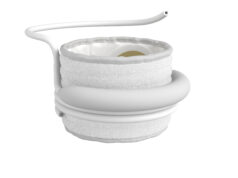 EnCompass Technologies has announced that the US Food and Drug Administration (FDA) has granted conditional investigational device exemption (IDE) approval for its F2 cerebral embolic protection system.
EnCompass Technologies has announced that the US Food and Drug Administration (FDA) has granted conditional investigational device exemption (IDE) approval for its F2 cerebral embolic protection system.
According to the company, the F2 Filter is the only filter with pores small enough to block most emboli to the brain while preserving blood flow during a transcatheter aortic valve implantation (TAVI) procedure, with an average pore size of 30µm. During the TAVI procedure, 360-degree wall apposition of the F2 filter in the aortic arch is designed to prevent migration. The F2 filter is attached to a self-expanding nitinol stent.
Researchers from University of California, Los Angeles (UCLA, Los Angeles, USA) presented an in vitro study comparing the F2 filter versus Boston Scientific’s Sentinel cerebral embolic protection device at Society of Neurointerventional Surgery (SNIS) annual meeting (14–17 August, San Diego, USA).
Using a 3D printed silicone model of the aortic arch perfused with saline at 5 L-min-1, artificial emboli of three sizes (45-53µm, 106-125µm, and 250-300µm) were injected into the aortic root. Effluent was continuously collected from the left and right common carotid and vertebral arteries. For all sizes of emboli, the F2 filter prevented 94% more emboli from reaching the brain than Sentinel, the researchers reported.
In April 2023, a first-in-human (FIH) study began in Tbilisi, Georgia, where three patients undergoing TAVI received the F2 filter. This small cohort of patients demonstrated 100% procedural success and no adverse events. In September 2023, a similar pilot study began in Australia and now with US FDA conditional IDE approval, EnCompass plans to commence its first US pilot study. These pilot clinical studies will lead to a US pivotal clinical trial in 2024.
“Brain injury after TAVI, as well as other cardiovascular procedures, remains a significant problem. As most of these complications are caused by emboli, it makes sense to use a filter that blocks most harmful emboli from entering the brain. The US pilot study, along with our growing clinical experience outside the US, represents the beginning of our clinical journey towards demonstrating meaningful patient benefits,” said George Wallace, CEO of EnCompass Technologies.










